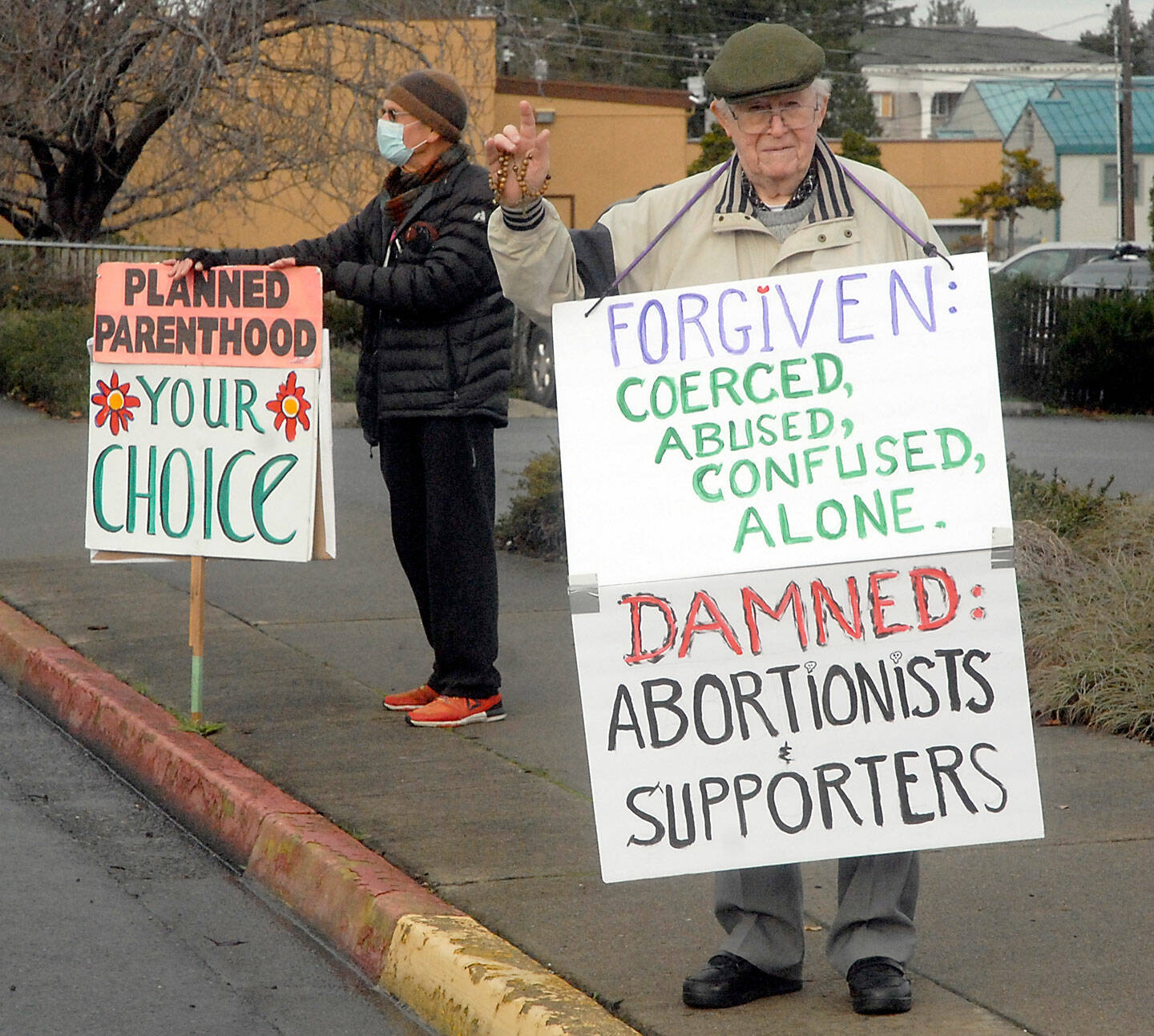PORT ANGELES — A handful of anti-abortion protesters faced one person holding a pro-choice sign outside Planned Parenthood’s Port Angeles Health Center as the day that the U.S. Supreme Court began its hearing on a Mississippi law that would ban abortion after 15 weeks.
Although a decision on Dobbs v. Jackson Women’s Health Organization isn’t expected until June, in this biggest challenge to abortion rights in decades, the Supreme Court’s conservative majority on Wednesday signaled after two hours of arguments that they would allow states to ban abortion much earlier in pregnancy, according to The Associated Press.
Commentators have speculated that the court, which has a 6-3 conservative majority, might overturn Roe v. Wade, the decision that created the nationwide right in 1973, two years short of half a century ago.
“At the very least, such a decision would undermine Roe and [Planned Parenthood v. Casey], which allow states to regulate but not ban abortion up until the point of fetal viability, at roughly 24 weeks,” Associated Press said in a story last week.
The Port Angeles protesters describing themselves as pro-life — about 10-to-12 — held signs supporting the overturning of Roe v. Wade and condemning those who get abortions as well as those who support places like Planned Parenthood that provide abortion services. Planned Parenthood’s Port Angeles center at 426 E. Eighth St., is the only one it has on the North Olympic Peninsula.
One woman, Kathy Gonzales, held a sign saying she regretted having an abortion.
“When you’re 19, you’re not the wisest person in the world and sometimes you’re pressured into doing things that you’re not strong enough to stand up for,” Gonzales said on Wednesday.
“Back then, I really didn’t realize the ramifications that decision would have, especially after I became pregnant again and I miscarried and I saw that tiny person,” she said.
“Even though it was not very well developed yet, it was still a human and that was a hard thing to face… there was a lot of trauma that came with that decision.”
She said she was protesting in hopes that she could prevent others from being harmed.
“I’m trying to keep people from being hurt — the unborn, the women who have abortions, the men who possibly either don’t have a choice in the matter or the ones who pressured someone into having an abortion. It causes a lot of hurt to the woman, the child, the man, and even on a greater level in society,” Gonzales said.
Gonzales said she has been a victim of both rape and incest but feels these are not reasons for abortion, saying “those instances are both very traumatic, and abortion is traumatic and we don’t need one more trauma added on to another.”
Across the street from Gonzales was Brian Hogan, the lone supporter on Wednesday at the Planned Parenthood health center of a woman’s right to choose to have an abortion.
Hogan noted that he is normally not the only pro-choice supporter out there — protests have been conducted routinely for some time at the clinic — but on this occasion, he was the only one available.
“I don’t think in every case numbers matter,” he said. “I think it’s important for me to reflect that there are two sides to this, and that’s what I’m doing out here.”
Both sides received both supportive honks and jeers from passers-by on the busy arterial street. The hometowns of the protesters is not known.
Hogan said he had talked with Gonzales before. It is important to hear everyone’s stories but also to know that not everyone’s experience is the same, he said.
“I just listen to the stories. I couldn’t quibble with her statements about how she feels about her decisions,” Hogan said.
“Where I take exception is for anyone to assume that the consequences that they experienced apply to everyone else,” Hogan said.
While Gonzales may have regretted her abortion, a study conducted by researchers at the University of California San Francisco and published in “Social Science & Medicine” on Jan. 12, 2020, found that 95 percent of women who had had abortions in the past five years did not regret their decision; instead they felt it was the right decision for them at the time.
The study claimed that the hardest part for the women was making the decision and that much of their fear came from the stigma surrounding abortion in their communities.
“Those who struggled with their decisions or felt stigmatized were more likely to experience sadness, guilt, and anger shortly after obtaining the abortion,” the study said.
Gonzales said the Roe v. Wade decision, which upheld as a constitutional right to abortion “was based on not knowing when a human is a human … . Every human has these rights in our country — to life, liberty and the pursuit of happiness and you are definitely destroying their pursuit. They don’t get to have their life. That’s why I feel it’s unconstitutional.”
He said he wasn’t a constitutional attorney and so couldn’t weigh in on the legal aspects of the case before the U.S. Supreme Court, “but there is a precedence that this is one of the rights that we have in this country, to make these kinds of hard choices for ourselves.”
________
Reporter Ken Park can be reached at kpark@peninsuladailynews.com.

